广东省深圳市 Module 4 Unit 7 Poems Grammar 课件 (2)
文档属性
| 名称 | 广东省深圳市 Module 4 Unit 7 Poems Grammar 课件 (2) | 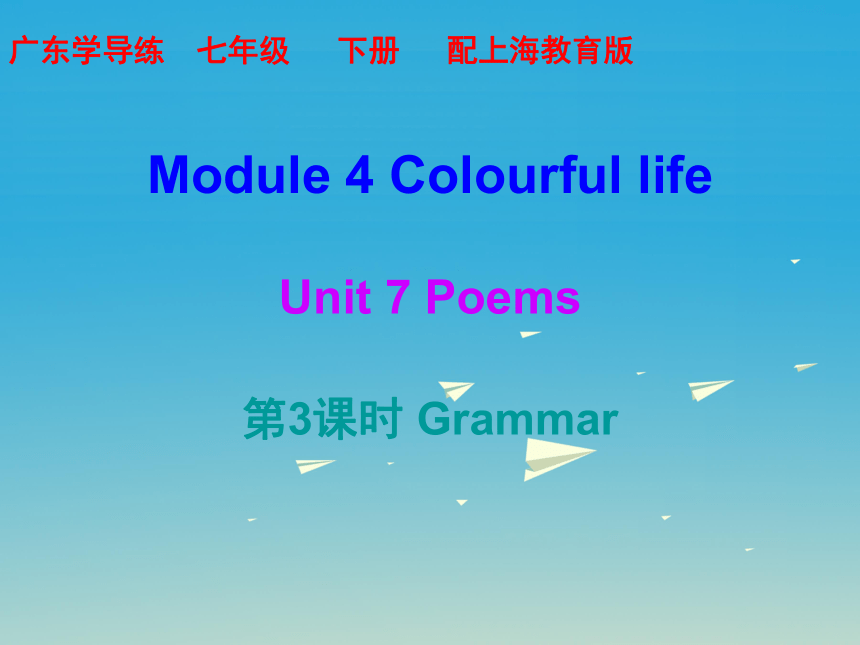 | |
| 格式 | zip | ||
| 文件大小 | 5.1MB | ||
| 资源类型 | 教案 | ||
| 版本资源 | 牛津深圳版 | ||
| 科目 | 英语 | ||
| 更新时间 | 2015-07-24 00:00:00 | ||
图片预览

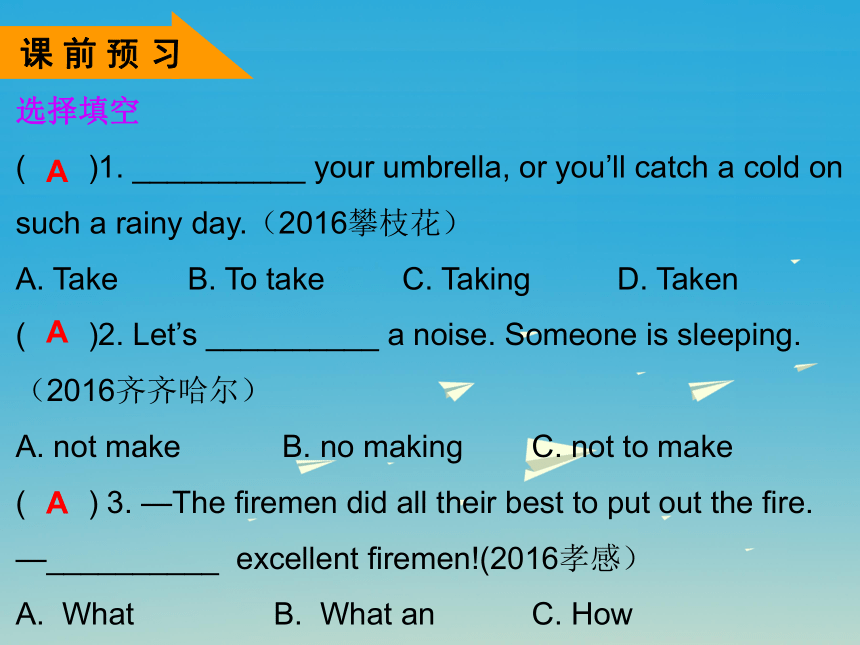
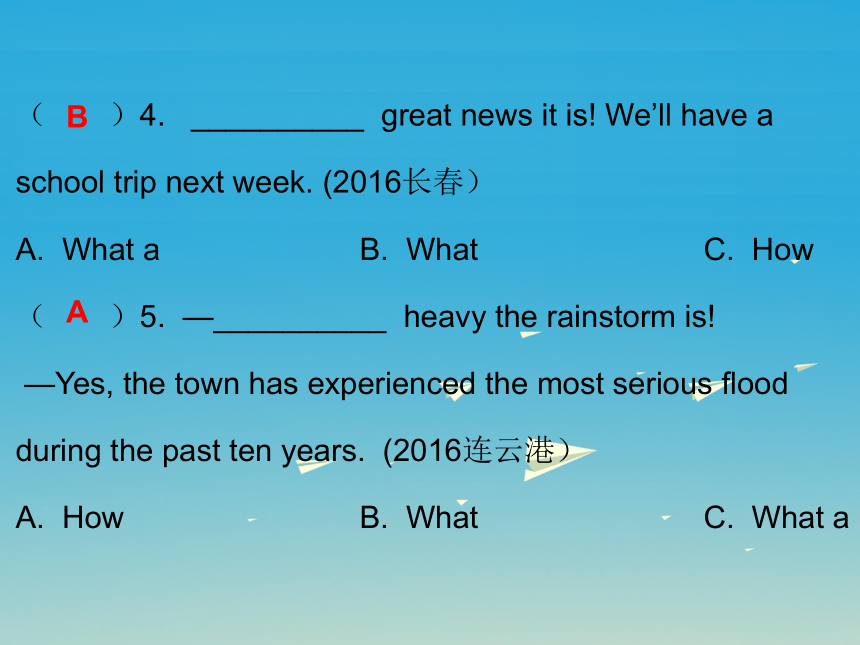
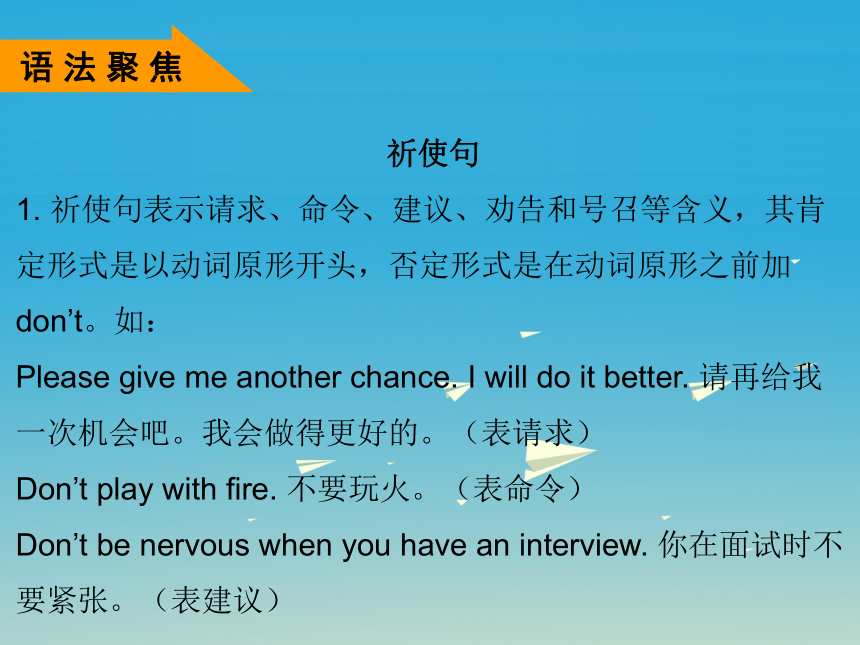


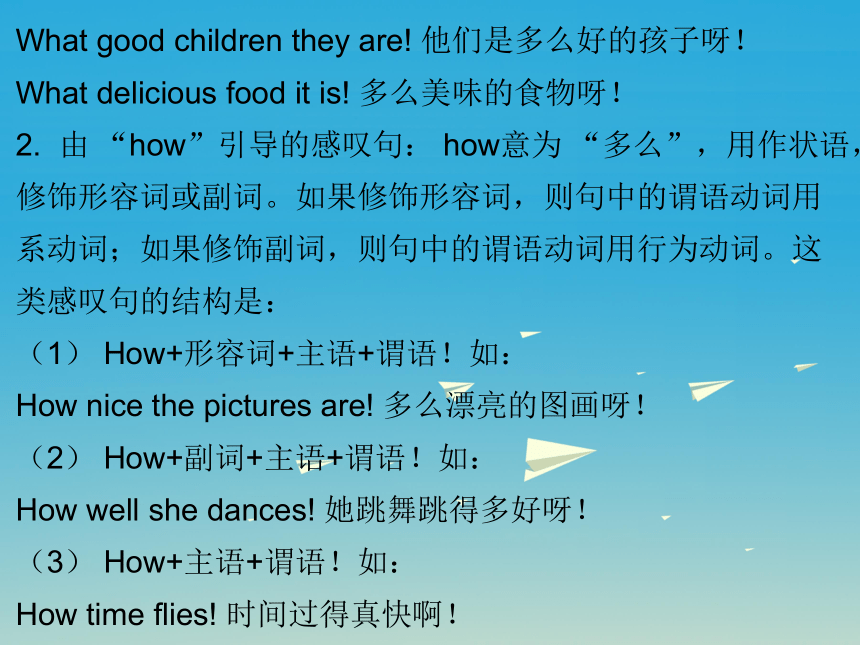
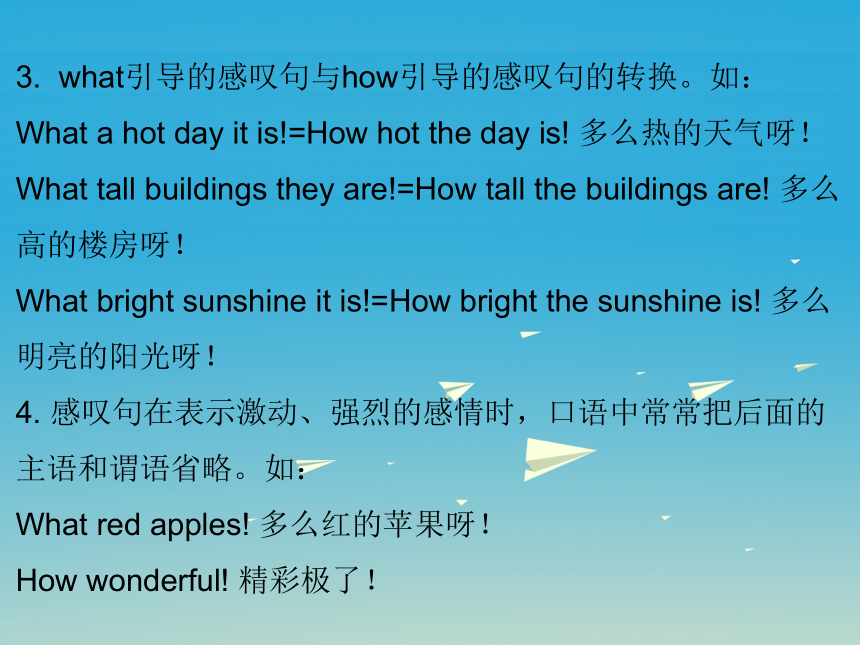
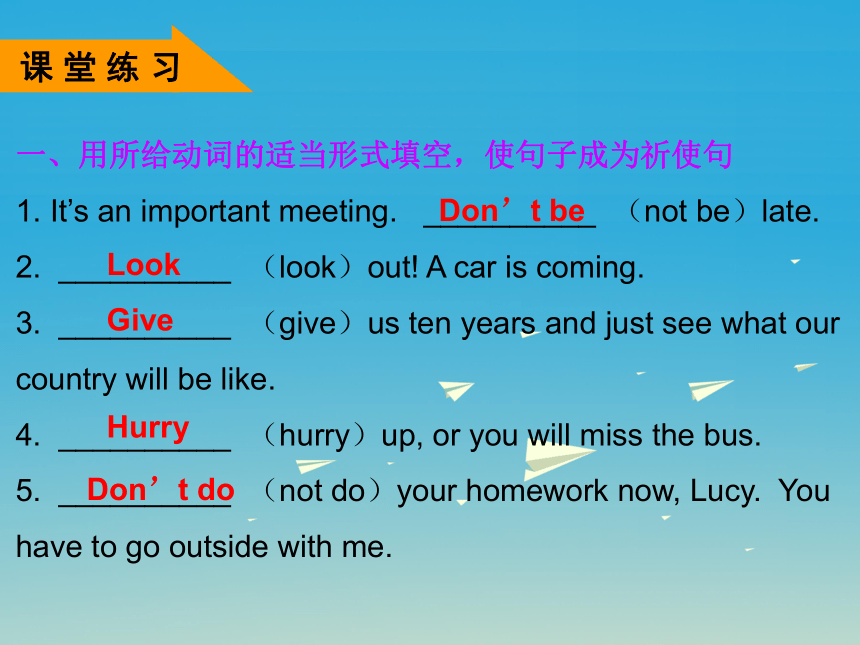
文档简介
课件20张PPT。第3课时 GrammarUnit 7 PoemsModule 4 Colourful life广东学导练 七年级 下册 配上海教育版选择填空
( )1. __________ your umbrella, or you’ll catch a cold on such a rainy day.(2016攀枝花)
A. Take B. To take C. Taking D. Taken
( )2. Let’s __________ a noise. Someone is sleeping. (2016齐齐哈尔)
A. not make B. no making C. not to make
( ) 3. —The firemen did all their best to put out the fire.
—__________ excellent firemen!(2016孝感)
A. What B. What an C. HowAAA( )4. __________ great news it is! We’ll have a school trip next week. (2016长春)
A. What a B. What C. How
( )5. —__________ heavy the rainstorm is!
—Yes, the town has experienced the most serious flood during the past ten years. (2016连云港)
A. How B. What C. What aB A祈使句
1. 祈使句表示请求、命令、建议、劝告和号召等含义,其肯定形式是以动词原形开头,否定形式是在动词原形之前加 don’t。如:
Please give me another chance. I will do it better. 请再给我一次机会吧。我会做得更好的。(表请求)
Don’t play with fire. 不要玩火。(表命令)
Don’t be nervous when you have an interview. 你在面试时不要紧张。(表建议)2. 以let开头的祈使句,后面加宾语和动词原形;否定形式是在动词前面加not。如:
Let’s protect our Earth together! 让我们一起保护地球吧!
Let us not talk about that matter. 我们不要谈论那件事。
3. 回答祈使句的时候,通常用will/won’t。如:
—Don’t forget to turn off the lights before you leave the lab. 离开实验室前别忘记关灯。
—No, I won’t. 好,我不会忘记的。感叹句
感叹句一般是用来表示说话时的喜悦、惊讶等情感。英语中的感叹句常用 “what”和 “how”引导。
1. 由 “what”引导的感叹句: what意为 “多么”, 用作定语,修饰名词。单数可数名词前要加不定冠词a/an,
复数可数名词或不可数名词前不用冠词。这类感叹句的结构是:
(1) What+a/an+形容词+单数可数名词+主语+谓语!如:
What a clever girl she is! 她是一个多么聪明的姑娘呀!
(2)What+形容词+复数可数名词/不可数名词+主语+谓语!如:What good children they are! 他们是多么好的孩子呀!
What delicious food it is! 多么美味的食物呀!
2. 由 “how”引导的感叹句: how意为 “多么”,用作状语,修饰形容词或副词。如果修饰形容词,则句中的谓语动词用系动词;如果修饰副词,则句中的谓语动词用行为动词。这类感叹句的结构是:
(1) How+形容词+主语+谓语!如:
How nice the pictures are! 多么漂亮的图画呀!
(2) How+副词+主语+谓语!如:
How well she dances! 她跳舞跳得多好呀!
(3) How+主语+谓语!如:
How time flies! 时间过得真快啊!3. what引导的感叹句与how引导的感叹句的转换。如:
What a hot day it is!=How hot the day is! 多么热的天气呀!
What tall buildings they are!=How tall the buildings are! 多么高的楼房呀!
What bright sunshine it is!=How bright the sunshine is! 多么明亮的阳光呀!
4. 感叹句在表示激动、强烈的感情时,口语中常常把后面的主语和谓语省略。如:
What red apples! 多么红的苹果呀!
How wonderful! 精彩极了!一、用所给动词的适当形式填空,使句子成为祈使句
1. It’s an important meeting. __________ (not be)late.
2. __________ (look)out! A car is coming.
3. __________ (give)us ten years and just see what our country will be like.
4. __________ (hurry)up, or you will miss the bus.
5. __________ (not do)your homework now, Lucy. You have to go outside with me. Don’t beLookGiveHurryDon’t do二、用what或how填空
1. __________ useful electricity it is!
2. __________ interesting books they are!
3. __________ delicious the dish is!
4. __________ beautiful the dress is!
5. __________ well she sings!
三、语法填空
One day,I took my daughter to the park. As soon as we got there,my daughter 1._______ (run)to the swing (秋千)and asked for a push. When I was helpingWhatWhatHowHowHow ranmy daughter,I noticed another girl trying to make her own swing 2._______ (go)high by herself. Her old grandmother was sitting in the chair nearby and smiling at us. Gradually,my daughter was pushed higher and higher 3._______ me. Then I walked towards the little girl. I asked if I 4._______ (can) give a big push to her. She smiled and said“Yes”. For the next hour,I pushed the swings,and played with my daughter and the little girl. When we went home,I 5._______ (be)tired but very happy.
One day two years later,after a day’s work,I went 6._______ (pick)up my daughter before going home. gobycouldwas to pick While I 7.__________ (wait)outside the school gate,a little girl smiled sweetly at me and gave me a big hug. As I watched her 8._______ (run)away,I realized that she was the girl whom I gave a big push in the park.
So far,I haven’t forgotten her sweet smile and the warm hug that she gave me.
In fact,if we give love to others,love 9._______ (find)its way back to us. It may travel from heart to heart or it may blossom (开花)in the heart. The love we share,the kindness we 10._______(give),and the happiness we create will come back to us with a pleasant surprise. was waitingrunningwill findgive一、选择填空
( )1. —________ talk in class, Jim!
—Sorry, I ________ do it again.
A. Not; don’t B. Don’t; won’t C. Not; won’t
( )2. Let’s ________ make so much noise here.
A. don’t B. no C. not
( )3. —________ your turn when the traffic light is red.
—You’re right.
A. Wait B. Wait for C. Waiting forBCB ( )4. ________, or you’ll fail the exam.
A. Studying hard B. Study hard C. To study hard
( )5. ________ nice time the boys had playing football with the national team last Sunday!
A. What B. What a C. How
( )6. ________ bad weather it is! It has been raining for two weeks.
A. What B. What a C. How
( )7. ________ you have offered me! I am out of trouble now.
A. What valuable advice B. What valuable suggestion
C. How useful suggestionsB B AA( )8. ________ useful dictionary for beginners of English! Where did you get it?
A. How B. What a C. What an
( )9. —We are going to take part in Running Man.
—________ exciting news!
A. What B. What an C. How
( )10. —Jane won the first prize in the English speech contest.
—________ big progress she has made! She used to be weak in English.
A. How B. How a C. What BAC二、用how或what填空或用所给单词的适当形式填空
1. Jack won the first prize in the English competition.
__________ excellent he is!
2. __________ brave the woman is to save the boy from the danger of earthquake!
3. __________ an exciting match it is! Wonderful players and wonderful teams!
4. —So many people like to watch The Voice of China.
—__________ wonderful it is! I like it very much.
5. __________ dangerous it is to ride fast on a busy road!HowHowWhat HowHow6. —__________ hard Tony is working!
—Yes. We should learn from him.
7. __________ exciting news! We will listen to the music after the exam.
8. __________ heavily it is raining!
9. __________ happy children!
10. __________ wonderful music it is! I like it very much.
11. _____________ (stand) too close to North Americans. Give them more personal space.
12. —Is there a No.2 bus stop near here?
—Yes, there is. __________ (turn) left at the second crossing, and you will find it.HowWhatHowWhatWhatDon’t standTurn13. —__________(talk). The baby is sleeping.
—I’m sorry.
14. If the green light isn’t on, __________(wait) a minute.
15. —__________(be) late for school again, Tim!
—Sorry, I promise that I __________ (will).
三、语法填空
A dog entered a butcher’s shop with a note in his mouth. The note read, “$10 of lamb chops (羊排),please.”Don’t talkwaitDon’t bewon’t The butcher was very 1.__________ (surprise). He took the money, put a bag of chops in the 2. __________ (dog) mouth, and then he closed the shop 3.__________ (quick). He followed the dog and watched him wait for a green light. Then the dog crossed the road to a bus stop. He checked the timetable and sat on the bench. When a bus arrived, the dog checked the number and got
4. __________ it.
As the bus travelled out into the countryside, the dog enjoyed the scenery. After 5. __________ while, he stood on his back paws (爪子) 6. __________ (push) the “stop”surpriseddog’squicklyona to push button. Then the butcher followed 7. __________ (he) off.
The dog ran up to a house and dropped his bag on the ground. He went back down the path, took a big run, and
8.__________ (throw) himself against the door. No answer. He repeated the action a few times. Then a big man opened the door 9. __________ started complaining about the dog and beating him.
Seeing this, the butcher ran up and shouted at the man, “What are you doing? This dog is a genius!” The man replied, “Genius? No way! He has forgotten his key for the
10. __________ (four) time this month!”himthrewandfourth
( )1. __________ your umbrella, or you’ll catch a cold on such a rainy day.(2016攀枝花)
A. Take B. To take C. Taking D. Taken
( )2. Let’s __________ a noise. Someone is sleeping. (2016齐齐哈尔)
A. not make B. no making C. not to make
( ) 3. —The firemen did all their best to put out the fire.
—__________ excellent firemen!(2016孝感)
A. What B. What an C. HowAAA( )4. __________ great news it is! We’ll have a school trip next week. (2016长春)
A. What a B. What C. How
( )5. —__________ heavy the rainstorm is!
—Yes, the town has experienced the most serious flood during the past ten years. (2016连云港)
A. How B. What C. What aB A祈使句
1. 祈使句表示请求、命令、建议、劝告和号召等含义,其肯定形式是以动词原形开头,否定形式是在动词原形之前加 don’t。如:
Please give me another chance. I will do it better. 请再给我一次机会吧。我会做得更好的。(表请求)
Don’t play with fire. 不要玩火。(表命令)
Don’t be nervous when you have an interview. 你在面试时不要紧张。(表建议)2. 以let开头的祈使句,后面加宾语和动词原形;否定形式是在动词前面加not。如:
Let’s protect our Earth together! 让我们一起保护地球吧!
Let us not talk about that matter. 我们不要谈论那件事。
3. 回答祈使句的时候,通常用will/won’t。如:
—Don’t forget to turn off the lights before you leave the lab. 离开实验室前别忘记关灯。
—No, I won’t. 好,我不会忘记的。感叹句
感叹句一般是用来表示说话时的喜悦、惊讶等情感。英语中的感叹句常用 “what”和 “how”引导。
1. 由 “what”引导的感叹句: what意为 “多么”, 用作定语,修饰名词。单数可数名词前要加不定冠词a/an,
复数可数名词或不可数名词前不用冠词。这类感叹句的结构是:
(1) What+a/an+形容词+单数可数名词+主语+谓语!如:
What a clever girl she is! 她是一个多么聪明的姑娘呀!
(2)What+形容词+复数可数名词/不可数名词+主语+谓语!如:What good children they are! 他们是多么好的孩子呀!
What delicious food it is! 多么美味的食物呀!
2. 由 “how”引导的感叹句: how意为 “多么”,用作状语,修饰形容词或副词。如果修饰形容词,则句中的谓语动词用系动词;如果修饰副词,则句中的谓语动词用行为动词。这类感叹句的结构是:
(1) How+形容词+主语+谓语!如:
How nice the pictures are! 多么漂亮的图画呀!
(2) How+副词+主语+谓语!如:
How well she dances! 她跳舞跳得多好呀!
(3) How+主语+谓语!如:
How time flies! 时间过得真快啊!3. what引导的感叹句与how引导的感叹句的转换。如:
What a hot day it is!=How hot the day is! 多么热的天气呀!
What tall buildings they are!=How tall the buildings are! 多么高的楼房呀!
What bright sunshine it is!=How bright the sunshine is! 多么明亮的阳光呀!
4. 感叹句在表示激动、强烈的感情时,口语中常常把后面的主语和谓语省略。如:
What red apples! 多么红的苹果呀!
How wonderful! 精彩极了!一、用所给动词的适当形式填空,使句子成为祈使句
1. It’s an important meeting. __________ (not be)late.
2. __________ (look)out! A car is coming.
3. __________ (give)us ten years and just see what our country will be like.
4. __________ (hurry)up, or you will miss the bus.
5. __________ (not do)your homework now, Lucy. You have to go outside with me. Don’t beLookGiveHurryDon’t do二、用what或how填空
1. __________ useful electricity it is!
2. __________ interesting books they are!
3. __________ delicious the dish is!
4. __________ beautiful the dress is!
5. __________ well she sings!
三、语法填空
One day,I took my daughter to the park. As soon as we got there,my daughter 1._______ (run)to the swing (秋千)and asked for a push. When I was helpingWhatWhatHowHowHow ranmy daughter,I noticed another girl trying to make her own swing 2._______ (go)high by herself. Her old grandmother was sitting in the chair nearby and smiling at us. Gradually,my daughter was pushed higher and higher 3._______ me. Then I walked towards the little girl. I asked if I 4._______ (can) give a big push to her. She smiled and said“Yes”. For the next hour,I pushed the swings,and played with my daughter and the little girl. When we went home,I 5._______ (be)tired but very happy.
One day two years later,after a day’s work,I went 6._______ (pick)up my daughter before going home. gobycouldwas to pick While I 7.__________ (wait)outside the school gate,a little girl smiled sweetly at me and gave me a big hug. As I watched her 8._______ (run)away,I realized that she was the girl whom I gave a big push in the park.
So far,I haven’t forgotten her sweet smile and the warm hug that she gave me.
In fact,if we give love to others,love 9._______ (find)its way back to us. It may travel from heart to heart or it may blossom (开花)in the heart. The love we share,the kindness we 10._______(give),and the happiness we create will come back to us with a pleasant surprise. was waitingrunningwill findgive一、选择填空
( )1. —________ talk in class, Jim!
—Sorry, I ________ do it again.
A. Not; don’t B. Don’t; won’t C. Not; won’t
( )2. Let’s ________ make so much noise here.
A. don’t B. no C. not
( )3. —________ your turn when the traffic light is red.
—You’re right.
A. Wait B. Wait for C. Waiting forBCB ( )4. ________, or you’ll fail the exam.
A. Studying hard B. Study hard C. To study hard
( )5. ________ nice time the boys had playing football with the national team last Sunday!
A. What B. What a C. How
( )6. ________ bad weather it is! It has been raining for two weeks.
A. What B. What a C. How
( )7. ________ you have offered me! I am out of trouble now.
A. What valuable advice B. What valuable suggestion
C. How useful suggestionsB B AA( )8. ________ useful dictionary for beginners of English! Where did you get it?
A. How B. What a C. What an
( )9. —We are going to take part in Running Man.
—________ exciting news!
A. What B. What an C. How
( )10. —Jane won the first prize in the English speech contest.
—________ big progress she has made! She used to be weak in English.
A. How B. How a C. What BAC二、用how或what填空或用所给单词的适当形式填空
1. Jack won the first prize in the English competition.
__________ excellent he is!
2. __________ brave the woman is to save the boy from the danger of earthquake!
3. __________ an exciting match it is! Wonderful players and wonderful teams!
4. —So many people like to watch The Voice of China.
—__________ wonderful it is! I like it very much.
5. __________ dangerous it is to ride fast on a busy road!HowHowWhat HowHow6. —__________ hard Tony is working!
—Yes. We should learn from him.
7. __________ exciting news! We will listen to the music after the exam.
8. __________ heavily it is raining!
9. __________ happy children!
10. __________ wonderful music it is! I like it very much.
11. _____________ (stand) too close to North Americans. Give them more personal space.
12. —Is there a No.2 bus stop near here?
—Yes, there is. __________ (turn) left at the second crossing, and you will find it.HowWhatHowWhatWhatDon’t standTurn13. —__________(talk). The baby is sleeping.
—I’m sorry.
14. If the green light isn’t on, __________(wait) a minute.
15. —__________(be) late for school again, Tim!
—Sorry, I promise that I __________ (will).
三、语法填空
A dog entered a butcher’s shop with a note in his mouth. The note read, “$10 of lamb chops (羊排),please.”Don’t talkwaitDon’t bewon’t The butcher was very 1.__________ (surprise). He took the money, put a bag of chops in the 2. __________ (dog) mouth, and then he closed the shop 3.__________ (quick). He followed the dog and watched him wait for a green light. Then the dog crossed the road to a bus stop. He checked the timetable and sat on the bench. When a bus arrived, the dog checked the number and got
4. __________ it.
As the bus travelled out into the countryside, the dog enjoyed the scenery. After 5. __________ while, he stood on his back paws (爪子) 6. __________ (push) the “stop”surpriseddog’squicklyona to push button. Then the butcher followed 7. __________ (he) off.
The dog ran up to a house and dropped his bag on the ground. He went back down the path, took a big run, and
8.__________ (throw) himself against the door. No answer. He repeated the action a few times. Then a big man opened the door 9. __________ started complaining about the dog and beating him.
Seeing this, the butcher ran up and shouted at the man, “What are you doing? This dog is a genius!” The man replied, “Genius? No way! He has forgotten his key for the
10. __________ (four) time this month!”himthrewandfourth
